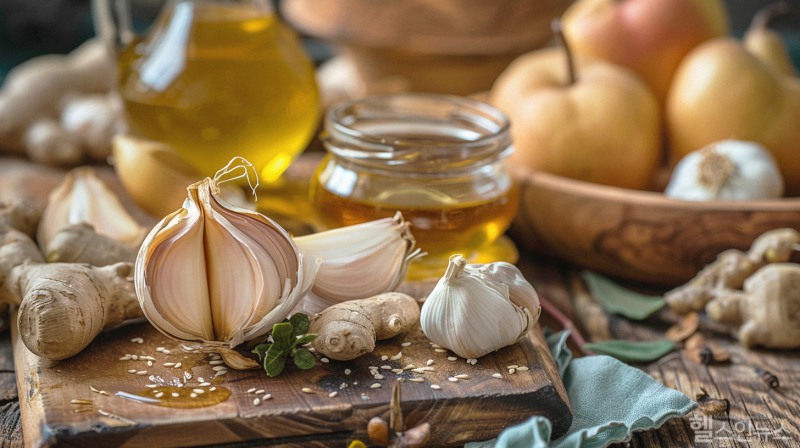To counter these risks, adopting healthy lifestyle habits and consuming foods that boost immunity and protect respiratory health is crucial. Fresh, seasonal produce and warm teas can significantly support health during these transitional periods.
Foods to Strengthen Immunity
Maintaining a robust immune system is paramount during seasonal changes. A weakened immune system increases vulnerability not only to symptoms like runny nose and sneezing but also to infectious diseases. Consuming foods rich in antioxidants and immune-activating compounds can help prevent these issues.
Ginger, often called a 'natural cold remedy,' is widely recognized for supporting respiratory health. Its gingerol and shogaol compounds promote blood circulation, warm the body, and alleviate cough and phlegm. Rich in antioxidants, ginger also strengthens resistance to viruses.
Fermented foods like kimchi and doenjang (Korean fermented soybean paste) are valuable for supporting seasonal immunity. They promote gut health by fostering beneficial bacteria, which in turn supports immune cell activation. Doenjang also contains bioactive compounds that may help alleviate allergic rhinitis symptoms.

Foods to Combat Respiratory Symptoms
Runny nose and sneezing during seasonal transitions often stem from dry, inflamed respiratory mucosa. Foods that keep the bronchial and nasal passages moist and reduce inflammation are particularly beneficial.
Pears, a hallmark of autumn, support bronchial health. Their luteolin content reduces inflammation, while their high water content helps hydrate the respiratory tract. Pears are also effective in relieving cough and phlegm, making them a valuable seasonal food.
Radish is another beneficial option. Traditionally noted for its warming qualities, it supports respiratory function, while its high vitamin C content boosts immunity and helps ease cough and phlegm. Radish is particularly helpful in relieving rhinitis symptoms such as runny nose and sneezing.
Lotus root is also recommended for its potent anti-inflammatory effects, which soothe nasal mucosa inflammation and protect the respiratory tract. It’s especially helpful for frequent coughing or sore throats.
Warm Teas to Protect the Nose and Throat
A cup of warm tea during seasonal transitions can safeguard the respiratory system and boost immunity. Certain teas, with their specific compounds, are particularly effective at relieving symptoms like runny nose and sneezing.
Ginger tea, with its strong antiseptic and anti-inflammatory properties, is effective in alleviating early cold symptoms and can also help with bronchitis, making it a recommended seasonal health tea.
Kudzu tea helps keep nasal mucosa moist and reduces fever, easing rhinitis symptoms. Its bitter taste can be softened by brewing it with jujube or pear.
Jujube tea, traditionally valued for restoring vitality, is rich in vitamins, flavonoids, and dietary fiber. Regular consumption supports immunity and may help alleviate rhinitis symptoms.
Green tea, packed with catechins and polyphenols, offers anti-allergic and antioxidant benefits, reducing symptoms like sneezing and itchy eyes.
Haeun Oh, HEALTH IN NEWS TEAM
press@hinews.co.kr


